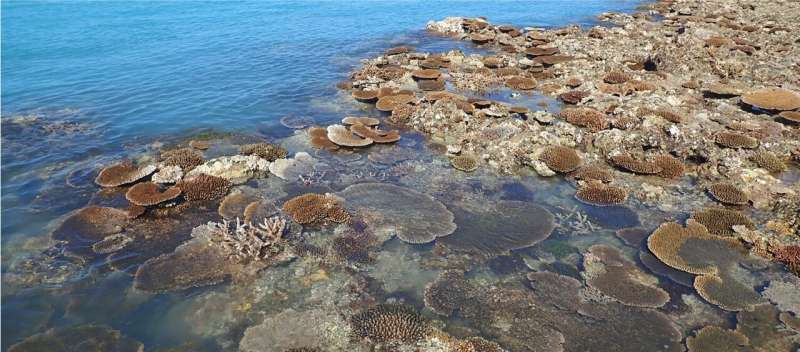Credit: Curtin University
New Curtin University research has found that the coral species living on the pristine reefs in Western Australia's Kimberley and offshore regions will be in danger of disappearing or moving south to cooler waters, if urgent action is not taken to address climate change.
Published in Diversity and Distributions, the study estimated the damage caused by climate change to coral reef systems, which are not only a vital food source and habitat for marine life, but also act as a natural barrier against extreme weather events, such as tsunamis and cyclones.
Lead researcher Ph.D. student Arne Adam said coral biodiversity on Western Australian tropical reefs is predicted to significantly reduce in the future, with many coral species likely to disappear in the tropics.
"We know climate change is increasing the temperature of the ocean, but if the water continues to get warmer, corals and associated marine species will no longer be able to survive in the tropics," Mr Adam said.
"Diverse coral hotspots in WA's pristine Kimberley region and off-shore reefs are predicted to drastically change and a large number of species won't be found there anymore.
"Our vital tropical coral ecosystems will not sustain the level of diversity they hold today and while coral species are predicted to move towards Ningaloo and further south where the environment is more suitable, others will be driven to local extinction."
Senior researcher Dr. Zoe Richards said this study is the first of its kind to integrate museum-curated coral records to estimate where species will move to over time. These records include environmental data such as sea surface temperature, depth range and light availability in the ocean.
"Despite the predicted expansion south, the study identified a net decline in coral biodiversity across the entire WA coastline. More tropical diversity will be lost at low latitudes than diversity gained at high latitude regions," Dr. Zoe Richards said.
"Under extreme future climate conditions, tropical regions will no longer be able to serve as Western Australia's coral biodiversity hotspots.
"Dominance shifts, tropicalisation and local extinctions are common responses of climate change, but uncertainty surrounds the reliability of predicted coral community transformations."
This study used species distribution models of more than 188 coral species to predict how coral biodiversity hotspots along the WA coastline are expected to shift under climate change conditions.
The full paper is titled "Diminishing potential for tropical reefs to function as coral diversity strongholds under climate change condition."
More information: Arne A. S. Adam et al, Diminishing potential for tropical reefs to function as coral diversity strongholds under climate change conditions, Diversity and Distributions (2021). DOI: 10.1111/ddi.13400
Journal information: Diversity and Distributions
Provided by Curtin University
























